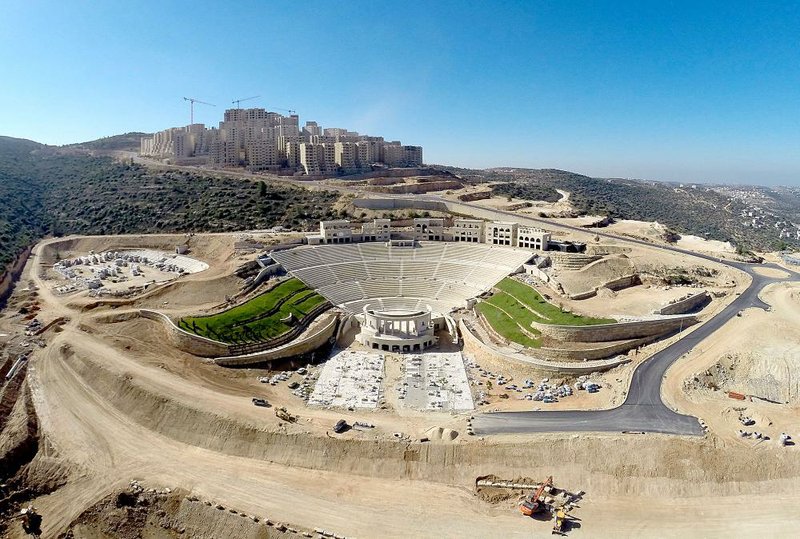JERUSALEM -- Prime Minister Benjamin Netanyahu has intervened to allow the newly constructed Palestinian city of Rawabi in the West Bank to connect to Israeli-controlled water sources, Israeli senior officials said Friday.
The $1 billion planned community of Rawabi, hailed as a model city in the West Bank, has seen its grand opening delayed for months by Israel's refusal to provide water.
Rawabi became embroiled in Israeli politics leading up the March 17 elections -- and perhaps even an embarrassment for Netanyahu before his trip to Washington to address a joint meeting of Congress on Tuesday.
In addition to the water war in Rawabi, Israeli authorities have pressed the Palestinians hard on other fronts in recent months.
The Israel Electric Co. began last week to strategically cut off power to the West Bank cities of Nablus and Jenin -- once for 45 minutes, once for an hour -- to force the Palestinian government to pay its electricity bills, now deep in arrears.
To protest the Palestinian Authority's move earlier this year to join the International Criminal Court in The Hague, the Israelis have also withheld for three months the transfer of $381 million in custom duties Israel collects on the Palestinians' behalf.
That money is used to pay the salaries of Palestinian government workers, including security and police forces. Palestinian workers have seen their salaries reduced by 40 percent.
Secretary of State John Kerry recently warned that the Palestinian Authority could collapse, which would throw the West Bank into turmoil.
Netanyahu's office proposed garnishing $75 million from the customs duties to pay the Palestinian electric bill. The Israel Electric Co. agreed to the deal, according to senior Israeli officials who briefed Israeli reporters late Thursday and foreign reporters on Friday, on condition of anonymity.
Israeli electricity providers say they are owed $485 million in total.
Mohammad Mustafa, economy minister for the Palestinian Authority, said all three actions -- the withholding of customs duties, water for Rawabi and electricity for Jenin and Nablus -- were "unilateral acts, made illegally and designed by the Israeli government to punish the Palestinians."
But Mustafa applauded the release of water for Rawabi.
"We're sorry it took so long," he said.
Israeli officials declined to describe the details of the water deal, saying only "understandings were reached for providing water to Rawabi."
Rawabi's developer, Bashar Masri, expressed relief at the water deal and said he had received assurances on Friday that it would go forward.
"For the first time I can go into a meeting and discuss the issues without the shadow of the water being approved," he said in a telephone interview from London, where he was attending meetings about job creation and funding for further Rawabi construction.
Masri said earlier that he has lost $25 million in revenue because of the delay, with an additional $75 million in payments frozen until he delivers the homes.
The project received hundreds of millions of dollars in Qatari financing, but now, Masri said, he was dipping into his own assets and slashing production, laying off 2,000 construction workers, engineers and office employees.
Builders were ready to hand over the keys to 450 buyers almost a year ago when the Israeli government began to stall on the water permit.
An Israeli military permission to turn on the tap in January was blocked by Silvan Shalom, the Israeli minister of national infrastructures, energy and water resources, a lawmaker who has come under pressure from right-wing, pro-settlement activists who oppose Rawabi.
The water holdup was a high-profile setback for the biggest and some say most hopeful development project in the West Bank.
Thousands of dignitaries -- including Kerry and U.N. Secretary General Ban Ki-moon -- have visited over the years to see Masri unveil each phase for what Time magazine called "a shining city on a hill."
The project has received $5 million from the U.S. Agency for International Development for roads and retaining walls.
Criticism over the water cutoff was heard from both Palestinians and Israelis.
"There is no way to explain why Israel is withholding water," said an opinion piece in Israel's largest-circulation daily newspaper, Yedioth Ahronoth. Rawabi "is a bourgeois, well-kept, demilitarized island, free of politics," it said.
Israeli President Reuven Rivlin had urged Israeli officials to turn on the tap. "We should be assisting them in the provision of water," Rivlin said at a recent democracy conference in Tel Aviv. "Don't we give water to the settlements?"
Rivlin, who in the past has opposed the creation of a sovereign Palestinian state, added that "Rawabi is in the interest of Israel."
Behind the scenes, there was growing concern in the Israeli defense establishment that the tensions could have security implications in the West Bank, where the Palestinian Authority was threatening to cut off security cooperation over the withholding of customs revenue and electricity.
Jewish leaders in Washington also voiced concern over the Rawabi impasse, just a few days before Netanyahu's address to U.S. lawmakers at the invitation of Speaker of the House John Boehner, R-Ohio.
On Thursday, State Department spokesman Jen Psaki was asked about the reaction to hooking up Rawabi to water, and the use of frozen Palestinian Authority tax funds to pay part of its tax bill and ensure uninterrupted electricity.
"I think we'd certainly see that as a positive step," Psaki said.
Israeli Maj. Gen. Yoav Mordechai is expected to provide the appropriate documents to proceed with the water connections next week.
"Now we can conclude all the issues that have been held up until we get the water," developer Masri said.
SundayMonday on 03/01/2015

